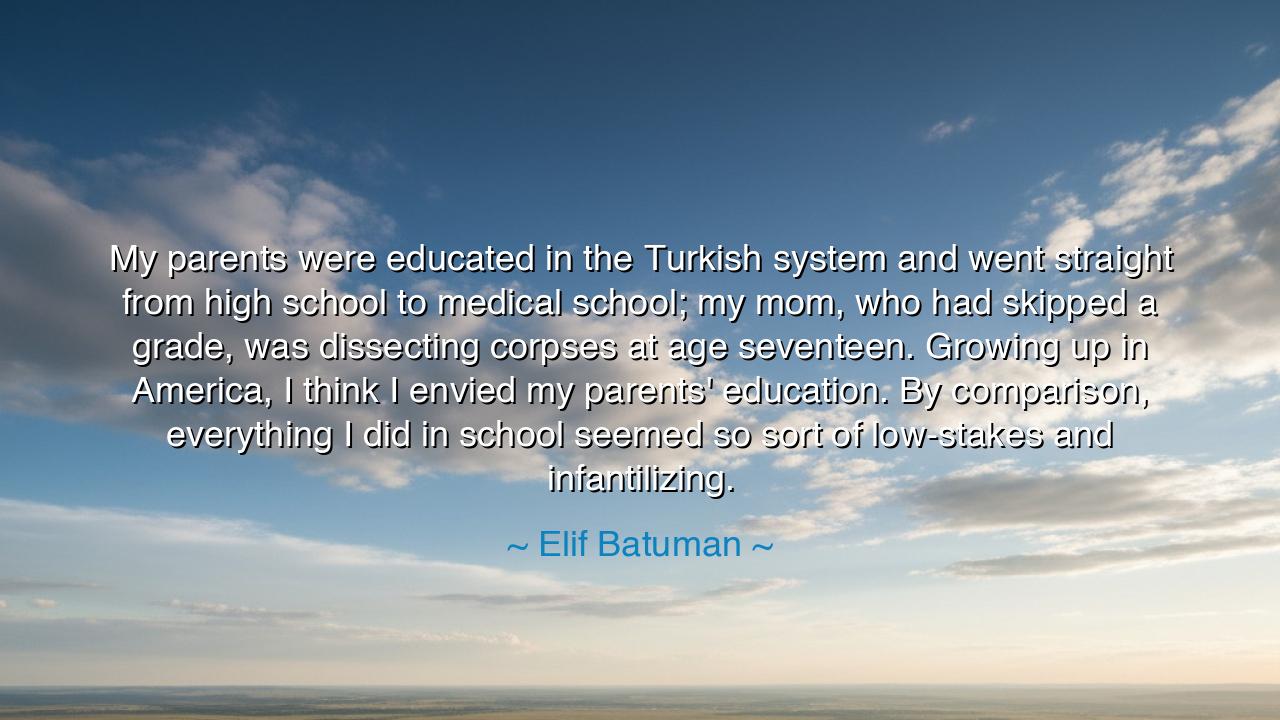
My parents were educated in the Turkish system and went straight
My parents were educated in the Turkish system and went straight from high school to medical school; my mom, who had skipped a grade, was dissecting corpses at age seventeen. Growing up in America, I think I envied my parents' education. By comparison, everything I did in school seemed so sort of low-stakes and infantilizing.






In the pursuit of knowledge, there are moments when we are confronted by the stark contrasts between our own experiences and those of others. Elif Batuman's reflection on her upbringing offers a glimpse into the deep feelings of envy and comparison that can arise when we see others, especially our parents, achieving great feats with ease: "My parents were educated in the Turkish system and went straight from high school to medical school; my mom, who had skipped a grade, was dissecting corpses at age seventeen. Growing up in America, I think I envied my parents' education. By comparison, everything I did in school seemed so sort of low-stakes and infantilizing." This sentiment speaks to a common human experience: the feeling that the education we receive pales in comparison to the deep, intense learning of those who came before us.
In the ancient world, education was seen not merely as a process of accumulating knowledge, but as a rite of passage, one that shaped the character and destiny of individuals. Socrates and his disciples engaged in profound intellectual pursuits that demanded not only intellectual rigor but the fortitude to withstand the trials of learning and growth. In many ways, Socrates viewed the mind as a muscle that needed to be exercised to attain wisdom. Like Batuman’s parents, those who pursued education in ancient times did so with intensity and purpose. In contrast, Batuman’s own experience of the American educational system felt more like a lighter, more diluted version, one that, though useful, seemed to lack the grit and seriousness that marked the academic journey of her parents.
Consider the Spartans, who were renowned not just for their physical prowess but for their disciplined and rigorous approach to education. Spartan boys were taken at a young age and immersed in a system of training and learning that prepared them for the harsh realities of life and battle. There was nothing frivolous about their education—it was about survival, mastery, and duty. This intense education was meant to forge individuals who were not only physically strong but also mentally sharp, capable of enduring the gravest challenges. Batuman’s envy of her parents’ education echoes this Spartan ideal—the belief that true learning is often harsh and uncompromising, pushing individuals to grow at an accelerated pace.
In the Renaissance, the great minds of that era, such as Leonardo da Vinci and Michelangelo, were immersed in an education that demanded mastery of multiple disciplines, from art to anatomy. Da Vinci famously dissected human bodies in his quest to understand not just the external world but the inner workings of the human form, much like Batuman’s mother dissecting corpses at a young age. The Renaissance ideal was one of intense, self-directed learning, where the pursuit of knowledge was not a passive endeavor but an active, almost relentless quest for understanding. Batuman’s comparison between her own American education and the Turkish system reflects a modern longing for the depth and rigor that characterized the lives of these historical figures.
Batuman’s words highlight the universal tension between different systems of education. In many ways, the American education system—designed to be more inclusive and democratic—often sacrifices intensity in favor of broad accessibility. This is not inherently negative, but it does create a sense of dissatisfaction for those who crave a more challenging and focused approach to learning. Her envy of her parents’ experiences reflects a yearning for an educational system that demands more, that pushes students to engage deeply with the world around them, just as the ancient and Renaissance scholars did.
The lesson that emerges from Batuman’s reflection is that true education is not just about learning facts or completing assignments—it is about the passion and commitment to growth, to understanding the world at a deeper level. Education, in all its forms, should challenge and shape the individual, forging character and resilience in the process. Just as Socrates sought to challenge his students through dialogue, and Michelangelo pushed the boundaries of art and anatomy, we must each find ways to engage in an education that requires more of us, one that shapes our minds and spirits for a greater purpose.
In our own lives, we should not measure the value of education by the ease of the path but by the challenges it presents. Whether through formal education or self-directed learning, we must seek to deepen our understanding, to engage with the material in a way that transforms us. As Batuman’s parents demonstrate, true mastery is achieved through dedication, hard work, and a relentless pursuit of knowledge. Let us each seek out the kind of education that sharpens our minds, hardens our character, and prepares us for the complexities of life. In doing so, we honor the legacy of those who have come before us and pave the way for future generations to live with wisdom and purpose.






AAdministratorAdministrator
Welcome, honored guests. Please leave a comment, we will respond soon